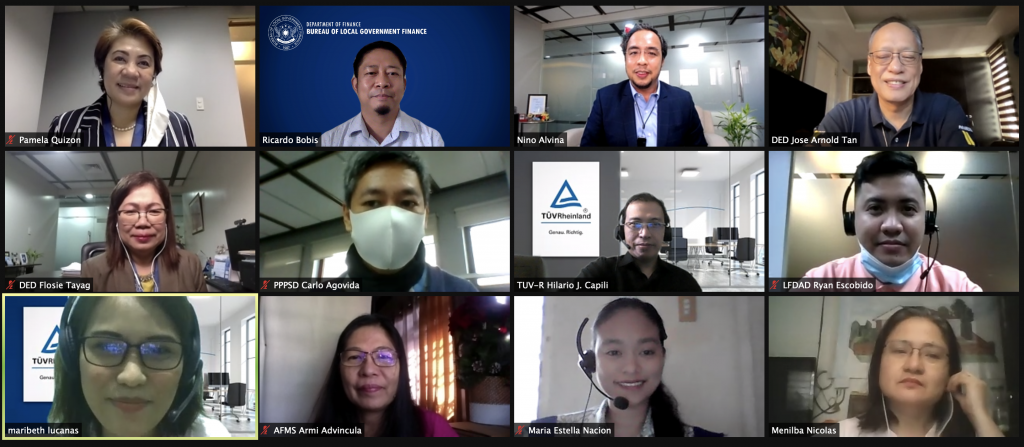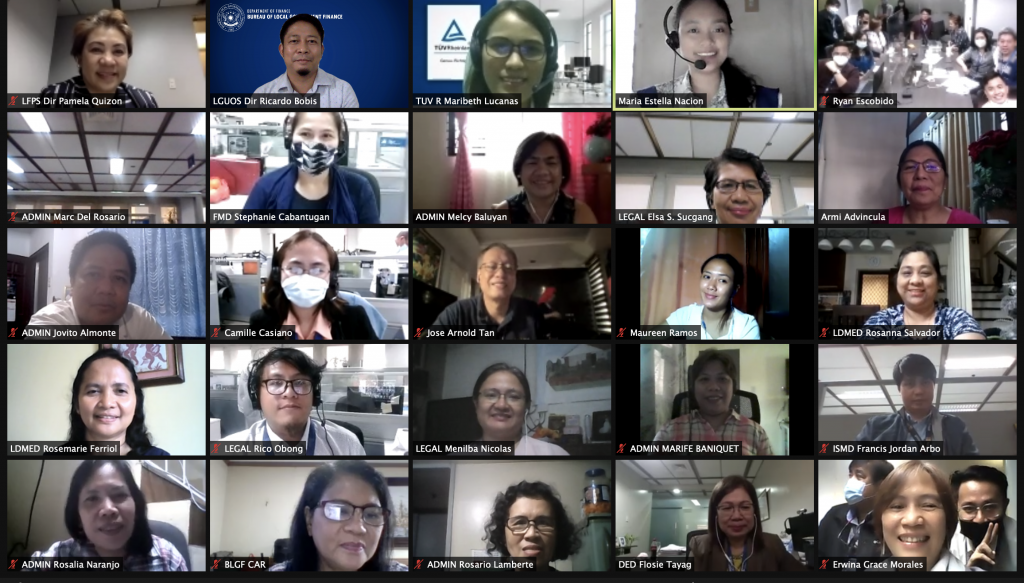

Closing the year amid the Covid-19 crisis, the Bureau of Local Government Finance (BLGF), an attached agency of the Department of Finance (DOF), has passed anew a third-party review of its compliance with international standards in quality management under ISO 9001:2015.
TÜV Rheinland, an independent certifying body, reported that its first surveillance audit of the BLGF on 28 December 2020 yielded zero non-conformity observations and found that the agency’s quality policy, internal systems and procedures, and management practices on the core process of Certification of Net Debt Service Ceiling and Borrowing Capacity (NDSC/BC) for Local Government Units (LGUs) are ISO-compliant.
With the onset of quarantine restrictions due to Covid-19 in March this year, the BLGF immediately streamlined the certification process for borrowing LGUs by shifting from manual to electronic approach and adopting faster turnaround time and release of certificates for LGUs with complete documentary submission.
As of December 2020, the BLGF has issued 258 borrowing certificates to various provinces, cities, municipalities, and barangays availing of credit financing, which is 64.33% higher than last year’s number of certifications made.
BLGF Executive Director Nino Raymond B. Alvina told TÜV Rheinland auditors that credit financing is vital in enabling LGUs meet their urgent expenditure requirements under the Covid-19 crisis and for their other development priorities and that the BLGF is ready to beef up its certification procedures.
“Looking back, we would not have been more prepared if we did not go through the ISO process, and we are more committed now as we continue the BLGF Quality Management System in the new normal,” said BLGF Executive Director Alvina during the audit of the BLGF Top Management.
The BLGF was first certified by TÜV Rheinland in December 2019 and formally awarded the certification in March 2020, as witnessed by Secretary Carlos G. Dominguez and Undersecretary Antonette C. Tionko of the DOF Revenue Operations Group.
Auditors from TÜV Rheinland commended the timeliness of the BLGF’s response and noted in its audit report that the 20-day certificate issuance had been consistently met despite the pandemic situation.
In its audit report, TÜV Rheinland concluded that the BLGF has established and maintains an effective system to ensure compliance with its policy and objectives, and confirmed, in line with the audit targets, that the organization’s management system complies with, adequately maintains and implements the requirements of the standards.
Under the current alternative work arrangement in the BLGF Central and Regional Offices, the application, evaluation, and issuance of the certificate of NDSC/BC is now being made electronically, in accordance with BLGF Memorandum Circular 007.2020 and DOF Department Order No. 054.2016.
This year, the BLGF certified the aggregate borrowing capacities of LGU applicants at Php201.91 Billion, wherein their total borrowing requirements represented Php80.91 Billion or 40.07% of what the LGUs can borrow.
For Covid-19-related borrowings, 18 certificates were issued by BLGF representing an aggregate loan requirement of LGUs at Php16.25 Billion, the bulk of which is for provinces with Php12.41 Billion (76.4%), followed by cities with Php2.67 Billion (16.4%) and municipalities at Php1.18 Billion (7.3%).
The proposed projects for Covid-19 response include procurement of equipment and medical supplies for testing, construction of clinics and hospitals, procurement of electronic equipment for students, support to local farmers, among others.
In the certification process, the BLGF has also been analyzing the pandemic’s effects on the local fiscal position of LGUs and advising them accordingly on options to comply with the 20% statutory limitation on debt servicing, as required under the Local Government Code (LGC) of 1991.
Under the LGC and DOF regulations, LGUs are authorized to contract loans, credits, and other forms of indebtedness with any government or domestic private bank and other lending institutions to finance local infrastructure and other socio-economic development projects.
By December 2021, the BLGF will undergo another surveillance audit to determine if its existing ISO certification will be maintained.
